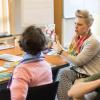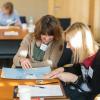Fill in your details to receive your copy of this free Team Activity: Recognising how different learning and thinking preferences play out in the workplace
The Learning at Work Week 2022 theme is 'LEARNING UNCOVERED'.
Understanding, empathy, trust, honesty….all important factors in developing motivation, loyalty, effective teamwork and improved performance.
But how do you start to really learn about others in the workplace so that you can uncover, recognise and support their needs, use people in the most appropriate roles and help them to challenge themselves in the future? Many psychometric tests are available to raise awareness of individual differences. However, being aware of preferences is not enough. Awareness has to translate into behavioural change if relationships and results are to improve. In most cases, this requires active practice and reflection, individually or in groups. This is an approach to help uncover everyone’s hidden powers and talents, with activities that encourage colleagues from all parts and all levels of the organisation to connect, share and learn from each other.






